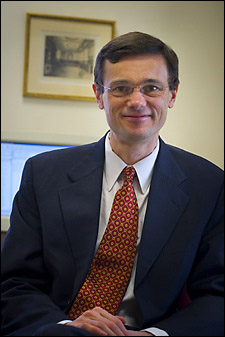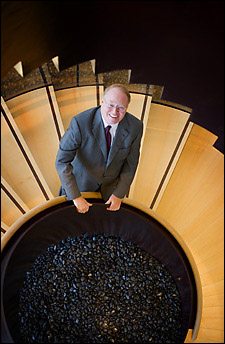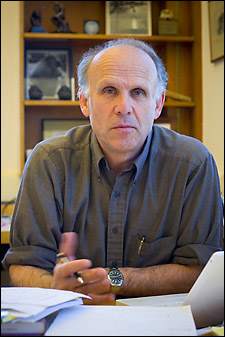Four at FAS get five-year appointment
Professors honored for fine teaching
Four members of the Faculty of Arts and Sciences have been selected as Harvard College Professors, an honor recognizing particularly distinguished contributions to undergraduate teaching in all its forms: in Core courses and in general education, in teaching within concentrations, and in advising and mentoring students.

This year’s new Harvard College Professors are John Campbell, Morton L. and Carole S. Olshan Professor of Economics; John Coatsworth, Monroe Gutman Professor of Latin American Affairs and director of the David Rockefeller Center for Latin American Studies; Leah Price, professor of English and American literature and language; and Richard Wrangham, Ruth B. Moore Professor of Biological Anthropology.
Harvard College Professorships are five-year appointments that provide support for professional development, either in the form of research funding, a semester of paid leave, or summer salary. Recipients also receive additional support for their research and scholarly activities. The 24 Harvard College Professorships were established in 1997, with half of them derived from a gift of John and Frances Loeb.
The four new Harvard College Professors shared their pedagogical philosophies, their views on striking a balance between teaching and research, and their gratitude on being recognized as among Harvard’s exceptional educators.
John Campbell
“I teach a subject that attracts many students who hope to work in the financial sector after they graduate,” says John Campbell, an expert on financial economics. His current course offerings include “Capital Markets” for undergraduate concentrators and “Asset Pricing” for economics Ph.D. students. In the past he has also taught “Introduction to Investments” as part of the Quantitative Reasoning section of the Core Curriculum.
“While not hiding the practical aspects of finance, I try to expose undergraduates to the intellectual challenge of understanding the risks and returns in financial markets, and the public policy challenge of regulating these markets,” Campbell says. “I am thrilled to receive a Harvard College Professorship as recognition of the importance of this work.”
Campbell says that while it is a privilege to have such motivated and capable students, it is also a responsibility to teach them in a way that is consistent with the goals of a liberal arts education.

“John Campbell is a liontamer; he attempts to tame risk in his far-reaching analyses of stock and bond prices, interest rates, and the behavior of the market,” says William C. Kirby, Edith and Benjamin Geisinger Professor of History and dean of the Faculty of Arts and Sciences. “He makes clear, and exciting, the meaning of these movements, and his students praise his ability to communicate. In an article titled ‘Short-Sighted View of the Long Haul,’ Professor Campbell challenged conventional wisdom on long-term strategies for investment. With 20/20 vision of the long haul, I am pleased to name John Campbell a Harvard College Professor.”
John Coatsworth
John Coatsworth says his appointment as a Harvard College Professor inspired a mixture of surprise and delight – along with some worry about “how to live up to the standards of the truly great teachers this award has honored in the past.”
In his courses on the history of Latin America from independence to 1914, the history of Mexico, and Latin American economic and international history, Coatsworth says, “I try to teach students how to think rather than what to think about historical events and processes. Fortunately, they don’t need much help.”
“On average, Harvard College students are incredibly smart, articulate, and hardworking,” he adds. “I’m still surprised anyone would actually pay me to teach them.”
This year Coatsworth has taught lecture courses titled “The Cold War in Latin America” and “Major Themes in Latin American History” and a seminar course titled “The Economic History of Latin America.”
“John Coatsworth, eminent historian of Latin America, has brought worlds to life in the minds of his students, established new outposts for learning in South America, and opened countless opportunities for Harvard students to study abroad through his work on the Committee on Education Abroad,” Kirby says. “His students praise his deep knowledge and clarity, and many say he is the best professor they have had at Harvard. Twelve years ago, Latin American Studies was a small but growing presence at Harvard; John Coatsworth has done much to render it a force.”
Leah Price
Leah Price teaches courses on 18th and 19th century British novels, an honors seminar on sex and gender in Victorian fiction, a graduate seminar on theories of the novel, and a freshman seminar titled, “The Novel and Its Media from Don Quixote to the Internet.”
“Teaching Harvard students is a mind-altering experience,” she says. “Every time I walk into a seminar, I’m struck afresh by the same thing that excited me as a freshman: the luxury of having a group of curious, energetic, and intensely engaged people to argue with.”
“Writing can be lonely, especially in the humanities: Your audience is virtual, and your computer screen doesn’t talk back,” adds Price, who has not yet decided how she will use her Harvard College Professorship to foster professional development. “So having human beings to argue ideas out with, face to face, is intellectually and psychologically crucial. Even in lecture classes, I like to think of literary criticism as a participant sport, not a spectator sport.”
Price says that when teaching 18th and 19th century texts, “the challenge is double: to make the strange familiar … but also to make the familiar strange.” The strange is made familiar, she says, by bringing texts distant in space or time to bear on questions faced by our own culture, while the familiar is made strange by gaining critical distance on formal conventions that we now take for granted.

“Leah Price, who reads how we read, has brought creativity and daring to her historical explanations of the novel and anthology,” Kirby says. “Her work re-energizes debate on gender, class, social practices, and the literary market. Her students find her knowledgeable, enthusiastic, and, that highest praise, ‘funny,’ which carries weight against the literal weight of the 18th century tomes students carry around. Professor Price is charting new territory in her studies of literary secretaries and secretarial culture, and in her work on writer’s block. With no writer’s – or at least no speaker’s – block at all, I congratulate Professor Price on becoming a Harvard College Professor.”
Richard Wrangham
Noting Harvard College’s ongoing curricular review, Richard Wrangham says that being named a Harvard College Professor “would be a wonderful honor at any time, but it’s specially thrilling to receive it at a time when so many people are rethinking the best ways to engage and motivate students, and very humbling when I see the enormous efforts of my colleagues.”
Wrangham has co-taught the Core course “Evolution of Human Nature” with psychology professor Marc Hauser each year since 2001; his other undergraduate offerings have included “Primate Social Behavior” and “Biology of Aggression.” Wrangham co-teaches small undergraduate research seminar courses in which students develop their own research projects, including two this term: one on nutritional ecology and one on hunter-gatherer warfare. This year, he also co-taught a graduate seminar on reconstructing behavior from the fossil record.
“In big courses my first aim is of course to make the material accessible … and orderly, but the fun part comes in encouraging students to play with ideas,” Wrangham says. “In small courses I take this further, sharing my own uncertainties as I push beyond received wisdom. Tutorials offer the most rewarding teaching particularly because Harvard students engage so well: My aim is to find their passion, and then help them develop a project that builds on it.”
Wrangham says that carrying out research isn’t easy during the academic term, so he plans to use his Harvard College Professorship to write and spend more time in the field. “I’ll justify it by persuading myself that I’ll be a more interesting teacher as a result,” he says.
“Richard Wrangham, a biological anthropologist, looks deeply into the connections between biology and behavior in primate populations,” Kirby says. “In so doing, he sheds light on human evolution and human behavior. To parse, and understand, how we think, use language, meet, mate, and behave in communities affirms, perhaps, our humanity. Professor Wrangham’s students confirm this Harvard College Professor’s excellence as a guide.”




